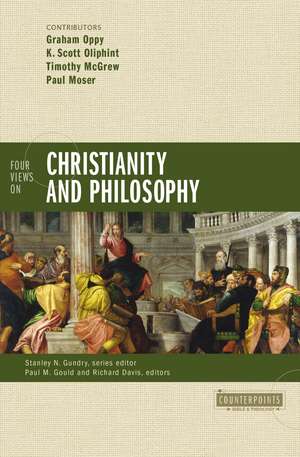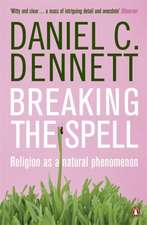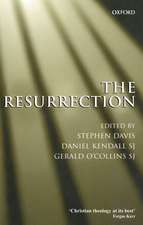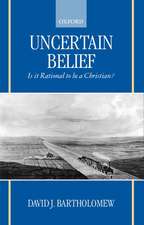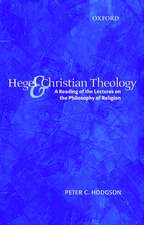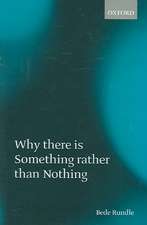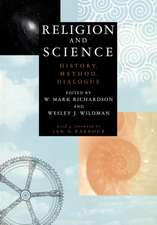Four Views on Christianity and Philosophy: Counterpoints: Bible and Theology
Contribuţii de Graham Oppy, K. Scott Oliphint, Timothy McGrew, Paul Moser Paul M. Gould, Richard Brian Davis Stanley N. Gundry Autor Zondervanen Limba Engleză Paperback – 12 sep 2016
Four Views on Christianity and Philosophy introduces readers to four predominant views on the relationship between philosophy and the Christian faith and their implications for life. Each author identifies the propositional relation between philosophy and Christianity along with a section devoted to the implications for living a life devoted to the pursuit of wisdom.
The contributors and views include:
- Graham Oppy--Conflict: Philosophy Trumps Christianity
- K. Scott Oliphint--Covenant: Christianity Trumps Philosophy
- Timothy McGrew--Convergence: Philosophy Confirms Christianity
- Paul Moser--Conformation: Philosophy Reconceived Under Christianity
Din seria Counterpoints: Bible and Theology
-
 Preț: 119.55 lei
Preț: 119.55 lei -
 Preț: 119.72 lei
Preț: 119.72 lei -
 Preț: 130.78 lei
Preț: 130.78 lei -
 Preț: 87.23 lei
Preț: 87.23 lei -
 Preț: 107.24 lei
Preț: 107.24 lei -
 Preț: 122.23 lei
Preț: 122.23 lei -
 Preț: 105.14 lei
Preț: 105.14 lei -
 Preț: 123.05 lei
Preț: 123.05 lei -
 Preț: 105.14 lei
Preț: 105.14 lei -
 Preț: 100.92 lei
Preț: 100.92 lei -
 Preț: 121.41 lei
Preț: 121.41 lei -
 Preț: 81.90 lei
Preț: 81.90 lei -
 Preț: 93.33 lei
Preț: 93.33 lei -
 Preț: 81.64 lei
Preț: 81.64 lei -
 Preț: 93.84 lei
Preț: 93.84 lei -
 Preț: 94.01 lei
Preț: 94.01 lei -
 Preț: 113.78 lei
Preț: 113.78 lei -
 Preț: 131.78 lei
Preț: 131.78 lei -
 Preț: 96.46 lei
Preț: 96.46 lei -
 Preț: 104.31 lei
Preț: 104.31 lei -
 Preț: 137.77 lei
Preț: 137.77 lei -
 Preț: 106.58 lei
Preț: 106.58 lei -
 Preț: 125.97 lei
Preț: 125.97 lei -
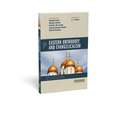 Preț: 130.96 lei
Preț: 130.96 lei -
 Preț: 152.26 lei
Preț: 152.26 lei -
 Preț: 129.92 lei
Preț: 129.92 lei -
 Preț: 128.39 lei
Preț: 128.39 lei -
 Preț: 165.81 lei
Preț: 165.81 lei -
 Preț: 126.66 lei
Preț: 126.66 lei -
 Preț: 130.13 lei
Preț: 130.13 lei -
 Preț: 111.83 lei
Preț: 111.83 lei -
 Preț: 126.86 lei
Preț: 126.86 lei -
 Preț: 126.86 lei
Preț: 126.86 lei -
 Preț: 107.04 lei
Preț: 107.04 lei -
 Preț: 126.66 lei
Preț: 126.66 lei -
 Preț: 147.25 lei
Preț: 147.25 lei
Preț: 110.42 lei
Nou
Puncte Express: 166
Preț estimativ în valută:
21.14€ • 22.97$ • 17.77£
21.14€ • 22.97$ • 17.77£
Carte disponibilă
Livrare economică 31 martie-14 aprilie
Preluare comenzi: 021 569.72.76
Specificații
ISBN-13: 9780310521143
ISBN-10: 0310521149
Pagini: 240
Dimensiuni: 132 x 202 x 17 mm
Greutate: 0.2 kg
Editura: Zondervan Academic
Colecția Zondervan Academic
Seria Counterpoints: Bible and Theology
Locul publicării:Grand Rapids, United States
ISBN-10: 0310521149
Pagini: 240
Dimensiuni: 132 x 202 x 17 mm
Greutate: 0.2 kg
Editura: Zondervan Academic
Colecția Zondervan Academic
Seria Counterpoints: Bible and Theology
Locul publicării:Grand Rapids, United States
Descriere
Philosophy and Christianity make truth claims about many of the same things. They both claim to provide answers to the deep questions of life. But how are they related to one another?
Four Views on Christianity and Philosophy introduces readers to four predominant views on the relationship between philosophy and the Christian faith and their implications for life. Each author identifies the propositional relation between philosophy and Christianity along with a section devoted to the implications for living a life devoted to the pursuit of wisdom.
The contributors and views include:
Four Views on Christianity and Philosophy introduces readers to four predominant views on the relationship between philosophy and the Christian faith and their implications for life. Each author identifies the propositional relation between philosophy and Christianity along with a section devoted to the implications for living a life devoted to the pursuit of wisdom.
The contributors and views include:
- Graham Oppy--Conflict: Philosophy Trumps Christianity
- K. Scott Oliphint--Covenant: Christianity Trumps Philosophy
- Timothy McGrew--Convergence: Philosophy Confirms Christianity
- Paul Moser--Conformation: Philosophy Reconceived Under Christianity
Cuprins
Introduction (Davis and Gould)View 1Conflict: Philosophy Trumps Christianity (Graham Oppy)Philosophy and Christianity make truth claims about the same things; further, they’re both ways of life. However, the deliverances of philosophy either refute the truth claims of Christianity (rebutting defeater), or at least undermine their rational or epistemic foundations (undercutting defeater); AND philosophy replaces Christianity as a way of life (e.g., pursuing truth, living a good life). That is, it either offers everything Christianity does (so that, by Ockham's razor, we don't need the Christian faith), or philosophy offers a superior way of living to that found in Christianity. (One might think, e.g., that Christianity included certain harmful elements, say, taking things by faith alone or being intolerant or uncritical.) The epistemic/methodological starting-point here is philosophy and the empirical data. Christianity contributes nothing to the warrant enjoyed by our ordinary philosophical beliefs.Response by Oliphint to OppyResponse by McGrew to OppyResponse by Moser to OppyView 2Covenant: Christianity Trumps Philosophy (Scott Oliphint)Philosophy and Christianity make truth claims about the same things; further, they’re both ways of life. However, the deliverances of Christianity (e.g., biblical truths) provide the ontological and epistemic foundations within which philosophy can properly do its work. Any philosophical claim that conflicts with orthodox theology is, by definition, illicit; AND Christianity replaces philosophy as a foundational discipline (e.g., properly pursuing truth, living a good life). It offers us a ground that philosophy cannot offer; and it describes and controls the approach to living if one wants properly to do philosophy. (One might think, e.g., that only Christianity can properly accommodate such moral essentials as redemption, reconciliation, and forgiveness.) The epistemic/methodological starting-point here is Christianity itself. Christianity doesn’t depend on philosophy for its warrant.Response by Oppy to Oliphint Response by McGrew to Oliphint Response by Moser to Oliphint View 3Convergence: Philosophy Confirms/Completes Christianity (Timothy McGrew) Philosophy and Christianity make truth claims about some of the same things, including some of the same important things, though there is significant unique material on each side; further, they can both be a way of life, though one may (and some do) pursue philosophy on the intellectual side without the sort of personal commitment that Christianity demands. However, philosophy, very broadly construed---i.e., reflecting on and reasoning (deductively and non-deductively) from the data of human experience, including historical data, and attempting to answer fundamental questions in a manner that is conceptually precise and dialectically rigorous---is the best way of acquiring and extending our knowledge, BUT, such philosophical reflection provides the tools for a logical, systematic, intellectual defense of Christianity based on public evidence; AND a philosophical way of life at its best, with its wholehearted commitment to finding the truth and following the argument wherever it leads, while not identical with the Christian life, is certainly consistent with it and can enhance and support it in many respects. The epistemic starting-points here include the data of general revelation, subjected to philosophical reflection, BUT these data alone do not allow us to answer the deepest questions about human nature and human destiny; it is therefore necessary to see whether there is any authenticated revelation that can answer these questions. AND philosophical reflection on the historical data of the Christian revelation shows that revelation to be well supported, not only for philosophers but for many believers who have not the advantage of a philosophical education or the leisure for sustained ph
